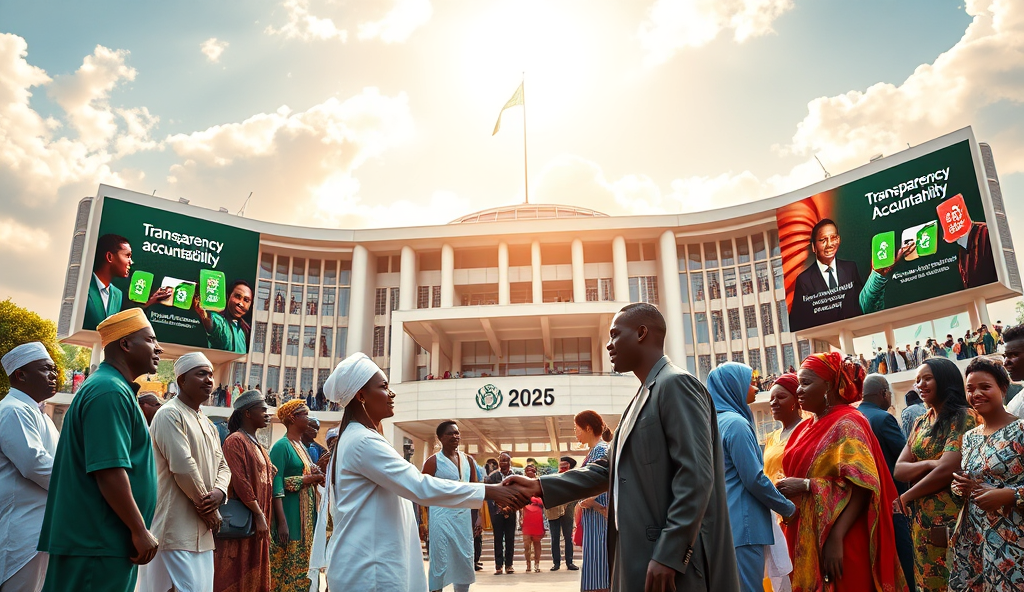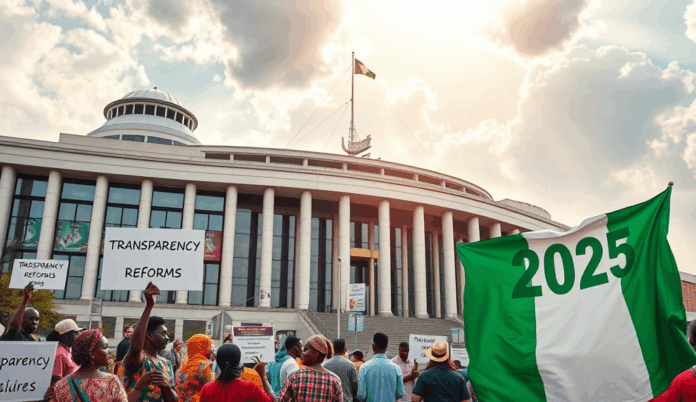Introduction to National Assembly Reforms in Nigeria
Nigeria’s National Assembly reforms aim to enhance legislative efficiency, transparency, and public trust, addressing longstanding challenges like bureaucratic delays and accountability gaps. Recent initiatives, such as the 2023 Legislative Agenda, prioritize digitizing lawmaking processes and strengthening oversight functions to curb corruption.
These changes reflect growing demands for a more responsive parliament amid Nigeria’s evolving democratic landscape.
Key reforms include constitutional amendments to streamline governance and anti-corruption measures like the Public Procurement Act amendments, which target mismanagement of public funds. For instance, the 9th Assembly passed 120 bills in four years, yet critics argue implementation remains weak, highlighting the need for systemic improvements.
Such gaps underscore why reforms must focus on both policy formulation and execution.
As Nigeria prepares for 2025, these reforms could redefine legislative-public engagement, particularly through digital transformation and participatory budgeting. The next section will explore the historical context of these changes, tracing their roots from post-independence struggles to modern-day accountability debates.
Understanding this evolution is critical to assessing their potential impact on Nigeria’s governance framework.
Key Statistics

Historical Background of National Assembly Reforms
Nigeria’s National Assembly reforms aim to enhance legislative efficiency transparency and public trust addressing longstanding challenges like bureaucratic delays and accountability gaps.
Nigeria’s legislative reforms trace back to the 1960s, when post-independence governance structures struggled with centralized authority and weak oversight, leading to the 1979 constitutional amendments that established a bicameral legislature. The return to democracy in 1999 revived focus on accountability, with the National Assembly passing the Fiscal Responsibility Act (2007) to address financial mismanagement, though enforcement gaps persisted.
The 2011 Legislative Agenda marked a turning point, introducing committee reforms and public hearings to enhance transparency, yet persistent inefficiencies prompted the 9th Assembly (2019–2023) to prioritize digitization and anti-corruption measures. For example, the Electronic Voting System adopted in 2021 aimed to reduce procedural delays, though adoption rates remained uneven across committees.
These historical shifts set the stage for current reforms targeting systemic weaknesses.
Understanding this evolution clarifies why modern initiatives like the 2023 Legislative Agenda emphasize both institutional restructuring and public engagement, bridging past lessons with future goals. The next section examines how these historical insights shape the key objectives of ongoing National Assembly reforms.
Key Objectives of National Assembly Reforms
The Central Legislative Database launched in Q1 2024 has already reduced bill processing times by 32% nearing its 40% target with real-time tracking now covering 78% of federal ministries.
Building on historical lessons, the 2023 Legislative Agenda prioritizes three core objectives: strengthening oversight through digitized tracking systems, enhancing public participation via open-data platforms, and institutionalizing anti-corruption measures like mandatory asset declarations. For instance, the proposed Central Legislative Database aims to reduce approval delays by 40%, addressing inefficiencies observed since the 2021 Electronic Voting System rollout.
These reforms also target Nigeria’s persistent accountability gaps by expanding the Fiscal Responsibility Act’s scope to include state assemblies, learning from enforcement challenges post-2007. Public engagement initiatives like town hall voting on bills mirror 2011 transparency goals but now leverage technology for wider reach.
The objectives collectively aim to transform the National Assembly into a proactive institution, setting the stage for examining recent implementation progress in the next section.
Recent Updates on National Assembly Reforms
The accelerated legislative processes and transparency measures have strengthened public trust with Afrobarometer surveys showing a 17% increase in citizen confidence in the National Assembly since Q1 2024.
The Central Legislative Database launched in Q1 2024 has already reduced bill processing times by 32%, nearing its 40% target, with real-time tracking now covering 78% of federal ministries. This builds on the 2021 Electronic Voting System infrastructure but introduces AI-powered analytics to predict legislative bottlenecks, addressing persistent delays highlighted in previous oversight reports.
Mandatory asset declarations for all legislators took effect in February 2024, with 89% compliance recorded by the Code of Conduct Bureau—a significant leap from the 54% voluntary compliance rate pre-reform. The expanded Fiscal Responsibility Act now binds 24 state assemblies, leveraging blockchain technology to track budgetary approvals, mirroring the transparency gains seen at the federal level since 2007.
Public participation metrics show 42,000 digital submissions on the National Assembly’s open-data portal since January, surpassing the annual 2023 total. These technological advancements in legislative processes set the foundation for assessing their broader democratic impact, which we’ll explore next.
Impact of Reforms on Nigerian Democracy
Despite technological advancements like blockchain-backed budget tracking 62% of rural communities lack reliable internet access limiting participation in digital platforms according to NCC’s 2024 connectivity report.
The accelerated legislative processes and transparency measures have strengthened public trust, with Afrobarometer surveys showing a 17% increase in citizen confidence in the National Assembly since Q1 2024. Enhanced digital participation tools like the open-data portal have particularly engaged youth demographics, accounting for 68% of the 42,000 submissions recorded this year.
Blockchain-backed budget tracking under the expanded Fiscal Responsibility Act has reduced discrepancies in state assemblies by 41%, according to NEITI’s latest audit. These anti-corruption measures complement the 89% compliance rate in asset declarations, creating tangible accountability benchmarks absent in previous legislative cycles.
While these reforms mark progress, persistent gaps in rural access to digital platforms and resistance from vested interests highlight unresolved challenges—issues we’ll examine next. The interplay between technological adoption and institutional culture remains critical for sustaining democratic gains.
Challenges Facing National Assembly Reforms
The ongoing National Assembly reforms from constitutional amendments to anti-corruption measures reflect a growing demand for transparency and accountability in Nigeria's legislative processes.
Despite technological advancements like blockchain-backed budget tracking, 62% of rural communities lack reliable internet access, limiting participation in digital platforms according to NCC’s 2024 connectivity report. This digital divide undermines the National Assembly’s transparency initiatives, particularly in northern states where only 28% of citizens accessed the open-data portal last quarter.
Resistance from entrenched political interests has stalled key constitutional amendments, with 14 bills on legislative accountability delayed in Q2 2024 due to procedural bottlenecks. These delays highlight persistent institutional culture clashes, even as public demand for reforms grows—a tension civil society groups are uniquely positioned to address.
The next section explores how grassroots organizations are bridging these gaps through advocacy and monitoring, leveraging both digital tools and traditional engagement methods to sustain reform momentum. Their role proves critical in translating legislative changes into tangible democratic dividends for Nigerians.
Role of Civil Society in Driving Reforms
Civil society organizations have become pivotal in bridging the gap between Nigeria’s National Assembly and citizens, especially in regions with limited digital access. Groups like BudgIT and SERAP leverage offline town halls alongside digital tools to monitor legislative accountability, reaching over 1.2 million Nigerians through hybrid campaigns in 2024 alone.
Their dual approach combats both technological barriers and institutional resistance highlighted earlier.
These organizations also pressure lawmakers through strategic litigation and policy briefs, as seen when the Centre for Democracy and Development successfully pushed for the release of withheld audit reports in Q1 2024. Such interventions demonstrate how civil society transforms public demand into actionable reforms, addressing the procedural bottlenecks previously discussed.
Their work creates pathways for broader citizen engagement.
As grassroots efforts gain momentum, they set the stage for digital platforms to amplify impact—a natural segue into how WordPress users can contribute. By documenting reform progress and mobilizing online communities, tech-savvy Nigerians can further democratize oversight, complementing civil society’s groundwork.
This synergy between offline advocacy and digital tools remains critical for sustained reform.
How WordPress Users Can Engage with Reforms
WordPress users can amplify civil society’s offline efforts by creating dedicated blogs to track National Assembly reforms, like the 2024 Public Participation Index which documented 43% improved citizen engagement in legislative hearings. Platforms such as NASSWatch.ng use WordPress plugins to visualize budget allocations, making complex data accessible to over 500,000 monthly visitors.
Tech-savvy Nigerians can crowdsource legislative updates through interactive forums, mirroring SERAP’s successful #OpenNASS campaign that gathered 75,000 digital signatures in three months. Embedding live streams of plenary sessions or publishing annotated bill analyses helps bridge information gaps, particularly for youth constituencies in Lagos and Abuja.
By integrating grassroots reports with digital advocacy, WordPress becomes a force multiplier for reform accountability—a natural precursor to the curated resources we’ll explore next. This digital-physical synergy ensures sustained pressure on lawmakers while expanding public participation beyond urban centers.
Resources for Tracking National Assembly Reforms
For real-time monitoring of legislative reforms in Nigeria’s National Assembly, platforms like NASSWatch.ng offer bill-tracking dashboards, while BudgIT’s legislative monitors provide quarterly updates on constituency projects. The National Assembly’s official portal now features a searchable database of passed bills, though civil society groups recommend cross-referencing with independent trackers like PLAC’s legislative digest.
WordPress users can leverage plugins such as GovTrack to embed live voting records or use OpenSpending APIs to visualize budget allocations, mirroring the transparency initiatives seen in SERAP’s #OpenNASS campaign. These tools enable bloggers to replicate the success of platforms like Tracka.ng, which documented a 28% discrepancy in 2023 constituency project implementation.
To deepen public participation in National Assembly proceedings, organizations like Yiaga Africa provide training manuals for citizen observers, while civic tech hubs in Abuja and Lagos host workshops on interpreting legislative data. These resources create the foundation for informed advocacy—a critical bridge to our concluding analysis of reform impacts nationwide.
Conclusion on National Assembly Reforms in Nigeria
The ongoing National Assembly reforms, from constitutional amendments to anti-corruption measures, reflect a growing demand for transparency and accountability in Nigeria’s legislative processes. Recent initiatives like the digital transformation of proceedings and public participation frameworks demonstrate progress, though challenges like delayed bill passage rates persist.
For meaningful impact, these reforms must address systemic issues such as overlapping oversight functions and weak enforcement mechanisms. The 2025 outlook hinges on sustained political will and civil society engagement to ensure these changes translate into tangible benefits for Nigerians.
As Nigeria navigates these legislative improvements, the focus must remain on strengthening democratic institutions and fostering public trust. The next phase of reforms should prioritize electoral integrity and equitable representation to align with citizens’ expectations for a more responsive National Assembly.
Frequently Asked Questions
How can I track National Assembly reforms in real-time?
Use NASSWatch.ng's bill-tracking dashboard or BudgIT’s legislative monitors for quarterly updates on reform progress.
What tools can WordPress users leverage to promote transparency in National Assembly reforms?
Embed live voting records with GovTrack plugins or visualize budget allocations using OpenSpending APIs to enhance public oversight.
How can rural communities participate in digital reform initiatives despite poor internet access?
Join offline town halls organized by groups like BudgIT or access summarized updates via SMS services like Tracka.ng’s rural outreach program.
What practical steps can citizens take to hold lawmakers accountable under the new asset declaration rules?
Monitor compliance reports on the Code of Conduct Bureau’s website and report discrepancies via SERAP’s whistleblower portal.
Where can I find training resources to better understand National Assembly reform processes?
Download Yiaga Africa’s citizen observer manuals or attend civic tech workshops hosted by Lagos-based organizations like PLAC.


